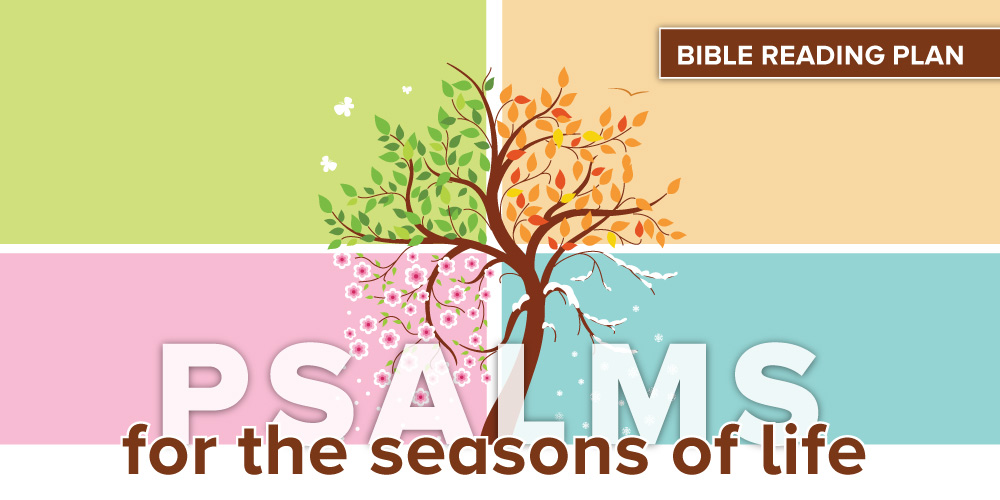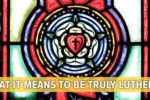 |
June 4–10
Psalm 129: “Psalm 129 contrasts with Psalm 128, which speaks of the blessing of the godly. The ungodly, who oppress the godly, will experience no blessing. . . . Whoever they may be, in whatever time of history they may exist, the oppressors of God’s people will be uprooted. In Psalm 128 the righteous are compared to fruitful trees and productive vines, but the ungodly are uprooted weeds, which shrivel up and have no value” (PBP 2, pages 229,230).
Psalm 130: (A Penitential Psalm) “ ‘Lord, hear my voice.’ . . . This is the expression of the soul when it feels that no creature will give heed to its distress, yes, that even God and all creatures seem to be striving against it. . . . Those who wait for the Lord, however, ask for mercy; but they leave it to God’s gracious will when, how, where, and by what means He helps them. . . . [The believer’s] soul always has its face directed straight toward God and confidently awaits his coming and his help, no matter how it may be delayed. . . . To know God aright is to recognize that with him there is nothing but kindness and mercy” (LW Vol. 14, pages 190,192-194).
Consider Richard Lauersdorf’s January article, “Psalm 130: When rocks fall.”
Psalm 131: “Instead of fretting and striving over things that are beyond our ability and beyond our control, we should rest quietly, like a young child with his mother. . . . [The child] has learned to trust his mother to provide [and] waits quietly for his needs to be fulfilled. God’s people are still children who depend on their Father’s care and provision, but they are not spiritual babies who demand satisfaction according to their timetable. Like respectful, trusting children, they wait on the Lord” (PBP 2, page 234).
Psalm 132: “[David desired to build the temple, but he was not allowed to build it. Solomon built it. Yet] in 2 Samuel 7 the Lord promised David that he would have a descendant who would rule on his throne forever. . . . The royal line of David was preserved until Jesus was born as the son of Mary and the heir of Joseph. . . . Jesus is the Son of David who fulfills the promise of an eternal kingdom. He provides peace and justice to the Israel of faith, and he builds God’s true Israel, the church of all believers. Entering into his glorious kingdom is the goal of every pilgrim on this earth” (COP 2, page 426).
Psalm 133: “The unity of God’s people is an occasion for joy. Anointing with oil was a symbol of joyful celebration and rich blessing from God. . . . The pleasant unity of God’s people is not mere organizational unity. It is not a unity based on political compromise. It is a unity based on shared loyalty to God and his Word. . . . It is based on agreement in the truth” (PBP 2, page 239).
Psalm 134: “Psalm 134 is a closing benediction to the songs of ascents [Psalms 120-134]. This benediction brings this collection of psalms to a fitting conclusion. Zion, the place of God’s presence, is the source of all blessing. Since the Lord is the maker of heaven and earth, he can provide every blessing for his people” (PBP 2, pages 239,240)
June 11–17
Psalm 135: “The Lord cannot be contained in the universe, yet he chose to dwell in a special way in the temple of Jerusalem. It was to Zion that he sent his Son. It was from Zion that the gospel went out to the world. The Lord is the God of Israel, but he is the God of the whole earth. There is no place that his people can go where they will be out of his sight or out of his care. Praise the Lord!” (COP 2, page 438).
Psalm 136: “The refrain, ‘His love endures forever,’ expresses the theme of the psalm. . . . [‘Love’] is a word that has the connotation of undeserved love and mercy. . . . The story of creation is a story of God’s love. . . . The Lord redeemed his people from slavery in Egypt. . . . The conclusion of the psalm restates the Lord’s redeeming and creating love in general terms. The redeeming love of the Lord reached its high point when Christ redeemed us from our enemies—sin, death, and Satan—and secured our eternal inheritance” (PBP 2, pages 243,244,246).
Psalm 137: “This psalm is a sad counterpart to the many psalms which speak of the joy the Israelites experienced during the festivals at God’s house in Jerusalem. . . . The psalmist describes the grief of the exiles as they sat along the rivers and canals of the land of Babylon. . . . [The Edomites and Babylonians] were enemies of Israel and opposed the Lord and his promises. [Both] were foreshadows of judgment day. . . . There will be no happy ending for the impenitent enemies of God. [The last verses] stand as a warning of the severity of God’s judgment against sin” (COP 2, pages 448,449).
Psalm 138: “[This psalm] calls upon all kings to join David in acknowledging the Lord. . . . David supports his invitation by his testimony concerning the blessings the Lord has given to him. David briefly catalogs these blessings. The Lord’s love and faithfulness are revealed in his promises and his actions. Nothing surpasses the greatness of the reputation God has established by his Word and his actions. . . . One of the ways the Lord helps us overcome adversity is by giving us the necessary courage and decisiveness to deal with it” (PBP 2, pages 250,252).
Psalm 139: “Psalm 139 is a practical discussion of God’s attributes, a doctrinal and devotional classic. . . . In the Bible there are no abstract, philosophical discussions of God’s nature and attributes. We always see God in action, working to uphold good and to oppose evil. . . . God knows our every move, our every thought. He even knows what we will say and what we will do in the future. Such knowledge is incomprehensible to creatures who are limited by time and space. Such knowledge is threatening to sinners. . . . But to those who are at peace with God through forgiveness of sins, God’s total knowledge is a comfort. . . . [God] uses his power, his presence, his knowledge, and all his other attributes to provide blessings which are too numerous to count” (COP 2, pages 454,456,461).
June 18–24
Psalm 140: “[The psalm] calls upon the Lord to rescue David and to judge his enemies. . . . David realizes that his only hope is in the Lord, so he turns to him. David’s call for judgment upon his enemies is motivated by three concerns: that God’s promises come true so that God’s honor may be upheld, that David be protected, and that the enemies be turned from their arrogant pride. David concludes with an expression of confidence in the Lord’s help” (PBP 2, pages 259,260).
Psalm 141: “David’s prayers would ascend to the Lord as the expression of a devoted heart. Our prayers too are like sacrifices and incense that are pleasing to God. As long as we remain in faith in Christ, we have continual peace with God. Christ’s righteousness is like a cloud of incense that hides our sins from God’s sight. . . . David prays that he will be kept free from sins of thought, word, and deed. . . . David is determined to practice and to encourage what is good. He is equally determined to oppose evil and evildoers relentlessly” (COP 2, pages 472,473).
Psalm 142: “Although this psalm was written for a specific trial in David’s life, it speaks in such general terms that it would be appropriate in almost any persecution which a Christian might suffer. The psalm begins and ends with appeals to the Lord for help and with expressions of confidence that such help will be provided. . . . When we are weary and confused, God knows our way. He understands our problems better than we do and knows what will be best for us. . . . When the battle is wearing us down, he is the source of our strength” (COP 2, page 476).
Psalm 143: (Note: This is the seventh penitential psalm.) “Every psalm, all Scripture, calls to grace, extols grace, searches for Christ, and praises only God’s work, while rejecting all the works of man. . . . The life of a saint is more a taking from God than a giving. . . . Since everything depends on [God’s] work and grace, [we] justly seek only grace and never feel secure in [our] own efforts. . . . The disconsolate soul which finds nothing in itself is God’s most cherished sacrifice, especially when it cries for his grace. God hears nothing more gladly than crying and thirsting for his mercy. . . . Christ is God’s grace, mercy, righteousness, truth, wisdom, power, comfort and salvation, given to us by God without any merit on our part” (LW Vol. 14, pages 196,200,204).
Psalm 144: “This psalm serves as a transition between the urgent appeals for help in the preceding psalms and the joyful praise in the following psalms. . . . This psalm has a strong military tone. . . . Governments may wage war to protect their citizens. . . . God himself is often compared to a soldier. . . . David, therefore, recognizes that his military abilities are a gift of God to be used for good, not for evil purposes. When Christ returns, he will return as a warrior who subdues his enemies” (COP 2, pages 482,485).
June 25–30
Psalm 145: “Much of this psalm consists of common phrases that occur in other psalms. . . . The whole universe is summoned to praise the Lord. . . . The sections which proclaim the Lord’s greatness are overwhelmingly positive. There is only one brief mention of his judgment against his enemies. The emphasis is upon the Lord’s mercy, which moves him to provide for his whole creation. . . . A second emphasis is the Lord’s special love and care for his people. . . . A new element here is an emphasis on God’s kingdom, that is, his ruling power. His rule of all things reaches its culmination in Christ, who has all things under his feet” (COP 2, pages 488,492,494,495).
Psalm 146: “The main focus of this psalm is on the protecting power of the Lord. . . . We think of the dramatic way the Lord did this through the ministry of Jesus. His ministry reminds us that the greatest gifts are not natural food, physical healing, and political freedom, but spiritual food, which gives eternal life; healing that frees us from sin and death; and freedom that will endure forever” (PBP 2, pages 275,276).
Psalm 147: “The greatness of God’s power is shown by his knowledge and control of the stars [and by] his management of the waters of the earth. . . . God’s Word by which he commands nature and his Word by which he communicates with human beings are set side by side in the last portions of the psalm. Although nature gives abundant testimony to the Lord’s goodness, we need the revelation of his Word to reach a full and clear understanding of God’s goodness in providing for us. We need such revelation for a clear knowledge of who our Creator and provider is. Israel had such knowledge. We do too” (PBP 2, page 278).
Psalm 148: “All creation, visible and invisible, animate and inanimate, is called to praise the Lord . . . . In the full sense, [the horn] refers to the King of kings, Jesus the Messiah. . . . It is fitting that as the book of Psalms draws to an end, our praise is directed to the Messiah. His rule has been the theme around which the book of Psalms revolves. He is the praise of God’s people” (PBP 2, pages 280-282).
Psalm 149: “Celebrating salvation requires ‘a new song’ because we are rejoicing in God’s new covenant that was established by Christ’s blood which was given and shed for us. The old way of trying to achieve salvation by works must be cast aside. The heathen must give up their futile, self-invented efforts to find God and sing a new song to the Lord. This song remains ever new because we never outgrow our need for it, nor should we ever grow tired of it. When Christ returns in judgment, everything will be made new. We will then have new cause for celebration. Even in eternity this song will never grow old” (COP 2, page 511).
Psalm 150: “The book of Psalms is a miniature Bible, a miniature history of God’s people. It expresses all the feelings and experience they will ever have. It is fitting that this book ends where our history and our experience will end—in the sanctuary of our God, singing joyful hallelujahs forever. For this we gladly shout, ‘Praise the Lord’ ” (PBP 2, page 285).
Want to dig in more? Read The People’s Bible: Psalms 1-72 and The People’s Bible: Psalms 73-150.
- Psalms for the seasons of life: May
- Psalms for the seasons of life: April
- Psalms for the seasons of life: June
- Psalms for the seasons of life: March
- Psalms for the seasons of life: February






